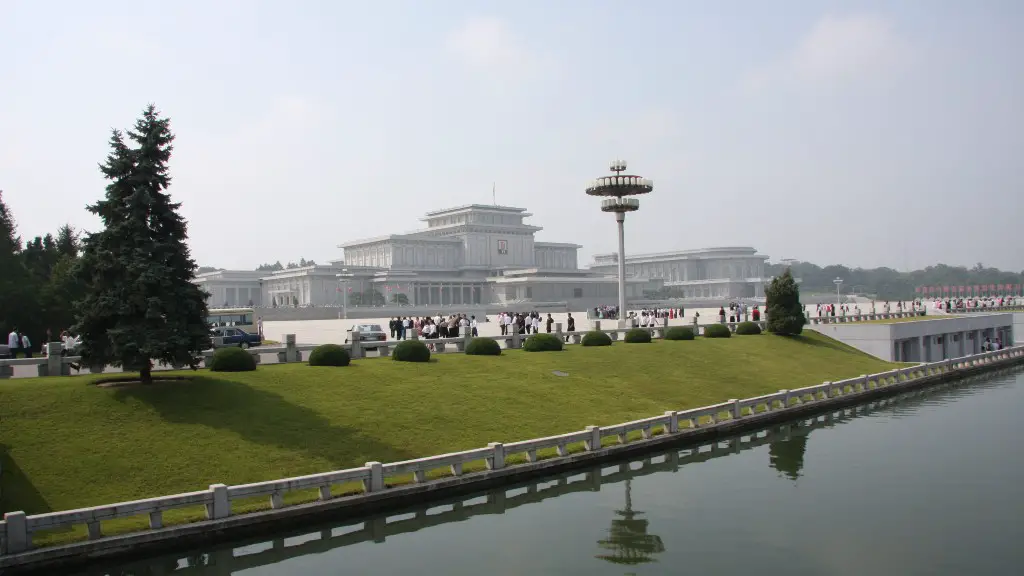Background
North Korea, officially known as the Democratic People’s Republic of Korea (DPRK), is an isolated country ruled by the authoritarian government of Kim Jong Un. Since its founding in 1948, North Korea has become one of the most reclusive and oppressive countries in the world. Over the years, the country has become known for its nuclear weapons program, human rights violations, and aggressive foreign policy. Recently, the country has been in the news for its provocative actions, including missile launches and nuclear tests. It is no secret that North Korea is a risk to international security and peace, and the international community has been trying to dissuade the country from provocative actions.
Economic Challenges
The economy of North Korea has long been in decline. In 2017, the World Bank reported that the country’s GDP per capita was only $1,700, compared to South Korea’s nearly $31,000. Economic sanctions imposed by the US and other countries have made it difficult for the country to obtain foreign aid and foreign investment. North Korea has attempted to address these issues by exporting mineral resources, such as coal and rare earth elements, but much of the money goes to its nuclear weapons program instead.
Military Provocations
North Korea has become increasingly belligerent in recent years, carrying out missile launches and nuclear tests in violation of international law. In 2017, the country launched 23 missiles, and tested more than a dozen nuclear warheads. These tests have been widely condemned by the international community, and have strained diplomatic relations with the US, Japan, and other countries. In addition, North Korea has been accused of using cyberattacks to disrupt infrastructure and steal funds from other countries.
Human Rights Abuses
North Korea consistently ranks among the countries with the highest levels of human rights abuses. In particular, the government is known for its use of prison camps to imprison political opponents, journalists, and dissidents. North Korea is also notorious for its censorship of the press and internet, and its control over the media. Because of this, the truth about what is happening in the country is often obscured, and the international community has difficulty intervening.
International Responses
In response to North Korea’s actions, the US and its allies have increased diplomatic and economic pressure on the country. The US and the UN have imposed economic sanctions on North Korea, and the US military has carried out joint military exercises with South Korea and Japan in an effort to deter further aggression. The US has also worked with China to try to convince North Korea to de-escalate. Despite these efforts, North Korea has continued to pursue its nuclear weapons program and engage in provocative behavior.
North Korea-US Diplomatic Relations
In an effort to reduce tensions between the US and North Korea, President Donald Trump has held several meetings with Kim Jong-un. During these meetings, they have discussed the nuclear weapons program and possible steps to de-escalate tensions. While North Korea has made some concessions, such as stopping its nuclear and missile testing, US officials remain wary of the country’s intentions. As a result, the US has continued to maintain close economic and diplomatic ties with South Korea and other allies in the region.
North Korean Defectors
As the situation in North Korea continues to deteriorate, the number of North Koreans attempting to defect from the country has also increased. According to a UN report, an estimated 30,000 North Koreans have defected to other countries over the past few decades. Many of these defectors have provided valuable insight into the human rights abuses and economic plight of the country.
Sustainability of International Pressure
Although international pressure has forced North Korea to pause its nuclear weapons program and missile tests, the sustainability of this pressure is uncertain. There is a risk that if the US and its allies relax their stance, North Korea could quickly return to its provocative behavior. Consequently, it is important that the international community continue to put pressure on North Korea to dissuade it from engaging in provocative behavior.
Implications of North Korea’s Actions
North Korea’s provocative actions and human rights abuses have had far-reaching implications on the security and stability of the region. The country’s bellicose foreign policy has caused tension with the US and its allies, and its missile and nuclear tests have caused alarm in the international community. In addition, the issue of North Korean defectors has caused strains between North Korea and neighbouring countries.
International Community Unity
It is clear that North Korea remains a major threat to international security and stability. In order to effectively address the issue, it is important for the international community to remain unified in its stance against the country’s provocative actions. This means that the US and its allies must continue to press North Korea to abide by international law and uphold human rights. Furthermore, the international community must also continue to extend assistance to North Korean defectors and continue to monitor the country’s activity.
Regional Security Cooperation
When it comes to North Korea, regional security cooperation is essential. Regional powers must work together to de-escalate tensions, provide humanitarian assistance to North Korean refugees, and monitor North Korea’s activities. South Korea, in particular, has taken a leading role in engaging with North Korea and advocating for peaceful dialogue. The US and its allies must continue to support these efforts and ensure that North Korea is held accountable for its actions.
Humanitarian Efforts
Despite the oppressive rule of the Kim Jong-un regime, there is still hope for a brighter future for North Koreans. It is essential that the international community continue to extend humanitarian assistance to North Koreans, particularly those who have been affected by the country’s human rights violations and economic impoverishment. Furthermore, the international community must also take steps to ensure that North Koreans have access to education and basic health care.
Regional Confidence Building
In order to effectively address the issues posed by North Korea, it is essential that the international community take steps to build confidence and trust between North Korea and its neighbours. This could include cultural exchanges and people-to-people diplomacy, as well as greater economic integration. Such steps could help to create a more stable environment in the region and, ultimately, bring an end to North Korea’s provocative actions.



